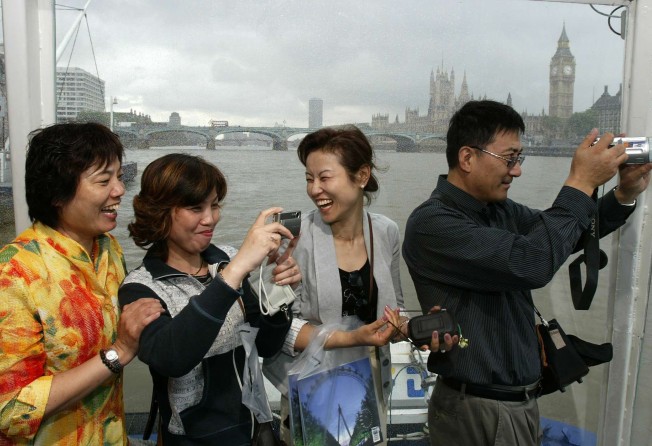Dropping pound, more favourable visas, to spark rise in Chinese tourist numbers to UK
After a 46 per cent rise in travellers from China last year, analysts expect the UK could be set for another bumper year post-Brexit

More Chinese travellers are expected to flock to Britain during the coming peak holiday season, thanks to the likely ongoing weak pound and easier travel rules, according to market watchers.
The 30-year low in the currency means the Brexit vote on June 23 to leave the European Union makes British goods and services far cheaper for foreign tourists, music to the ears of Chinese buyers of luxury goods, particularly.
The pound made history on June 24, slumping to its weakest level since 1985, hitting below 1.32 to the dollar.
The under-fire currency has recovered slightly since, but currency traders expect it to decline again in the second half, as many Brexit-related issues have yet to be resolved.
“Traders are focusing on pounds, but if more members seek to leave the EU, short sellers will turn to the euro,” said Jasper Lo, chief executive of King International.
Chinese travellers are the world’s biggest buyers of high-end goods with an acute awareness of best prices. They are equally well-known for following currency fluctuations to seek out deals.
“The weak sterling will stimulate Chinese travellers to spend more in Britain,” said Zeng Guang, an analyst at Guosen Securities in a report.
A sharply weaker Japanese yen and easier visa rules for Chinese travellers, lured many more visitors there late last year with the number of Chinese tourists to Japan hitting 4.99 million in 2015, almost double the previous year.
Christina Wang, a Beijing housewife, said she was going to Britain next week with her two children.
“Now is the sales season in Britain” she said. “The weak pound will being an extra 10 per cent discount on what I buy there, and that’s very attractive.
“Some of my friends who cannot go, have been asking me to buy luxury bags for them, too.”
Wang’s elder daughter plans to study in the UK when she finishes secondary next year, so her fees will also be less as a result for the lower pound.
“I am taking my children to have a look at some UK universities, and let them decide whether they want to study there.”
The UK has always been one of the favourite destinations of Chinese mainland travellers, with 270,000 trips made there last year, a 46 per cent rise on the previous year, according to the Office for National Statistics, the UK’s largest independent producer of official statistics.

In a further drive to attract more Chinese visitors, the British government is also planning more favourable visa policies.
Zeng said the measures should prove a real boost to the British and European economies, as they face likely downside pressures from the Brexit.
“Its effects on the British economy cannot be underestimated in the short and medium-term,” he added.
Daniel Meesak, chief operating officer at China Outbound Tourism Research Institute agreed, but added it is highly likely the British government will continue rolling out favourable visa policies in the hope of growing Chinese tourist numbers.
The latest moves were a two-year visa for Chinese nationals, introduced early this year, and a cut in visa fees.
However, Meesak has fears Britain might also have to increase value-added tax after the country leaves the European Union, meaning foreign buyers would have to pay duty and value-added tax when they cross the border between Britain and Europe.
This need, he added, might actually deter some from going to the UK, because they would have to pay taxes on items bought on the continent.
However, over the long term, the experts agreed the benefits are likely to outweigh the negatives for Chinese visitors to Britain, especially those from the higher-spending middle classes.